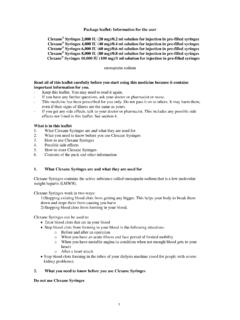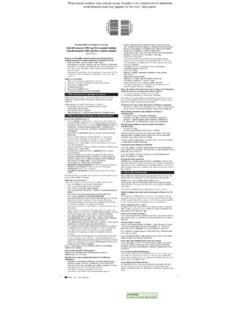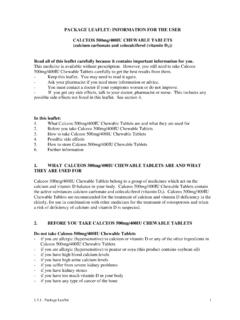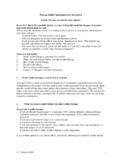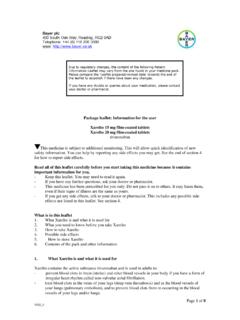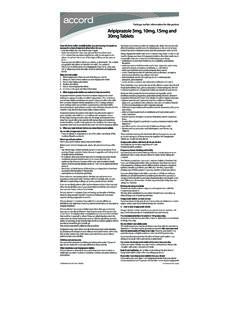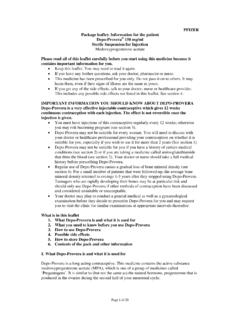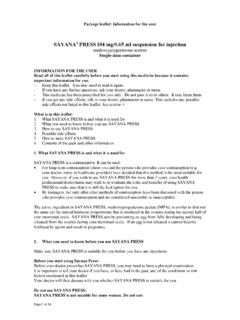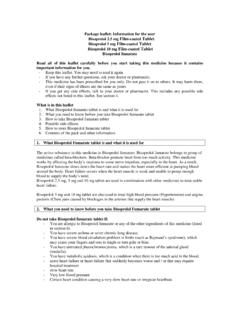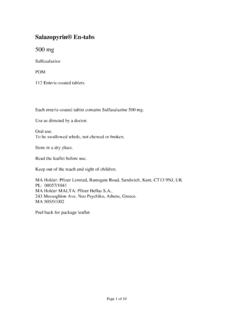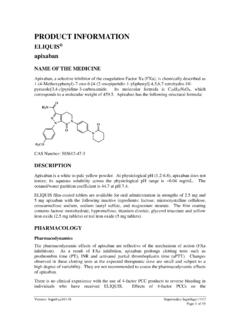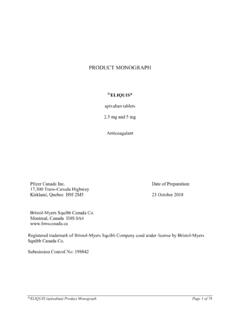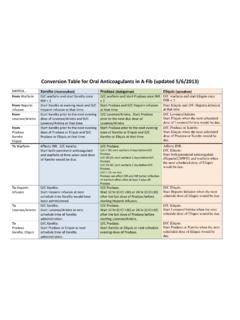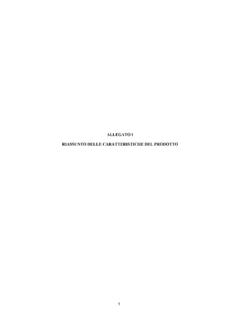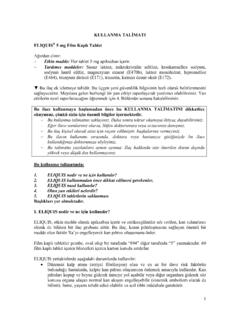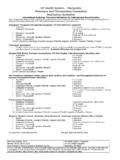Transcription of Package leaflet: Information for the user Eliquis 5 mg ...
1 1 Package leaflet : Information for the user Eliquis 5 mg film-coated tablets Apixaban Read all of this leaflet carefully before you start taking this medicine because it contains important Information for you. - Keep this leaflet . You may need to read it again. - If you have any further questions, ask your doctor, pharmacist or nurse. - This medicine has been prescribed for you only. Do not pass it on to others. It may harm them, even if their signs of illness are the same as yours. - If you get any side effects, talk to your doctor, pharmacist or nurse. This includes any possible side effects not listed in this leaflet . See section 4. What is in this leaflet 1. What Eliquis is and what it is used for 2.
2 What you need to know before you take Eliquis 3. How to take Eliquis 4. Possible side effects 5. How to store Eliquis 6. Contents of the pack and other Information 1. What Eliquis is and what it is used for Eliquis contains the active substance apixaban and belongs to a group of medicines called anticoagulants. This medicine helps to prevent blood clots from forming by blocking Factor Xa, which is an important component of blood clotting. Eliquis is used in adults: - to prevent a blood clot from forming in the heart in patients with an irregular heart beat (atrial fibrillation) and at least one additional risk factor. Blood clots may break off and travel to the brain and lead to a stroke or to other organs and prevent normal blood flow to that organ (also known as a systemic embolism).
3 A stroke can be life-threatening and requires immediate medical attention. - to treat blood clots in the veins of your legs (deep vein thrombosis) and in the blood vessels of your lungs (pulmonary embolism), and to prevent blood clots from re-occurring in the blood vessels of your legs and/or lungs. 2. What you need to know before you take Eliquis Do not take Eliquis if: - you are allergic to apixaban or any of the other ingredients of this medicine (listed in section 6) - you are bleeding excessively - you have a disease in an organ of the body that increases the risk of serious bleeding (such as an active or a recent ulcer of your stomach or bowel, recent bleeding in your brain) - you have a liver disease which leads to increased risk of bleeding (hepatic coagulopathy) - you are taking medicines to prevent blood clotting ( , warfarin, rivaroxaban, dabigatran or heparin)
4 , except when changing anticoagulant treatment, while having a venous or arterial line and you get heparin through this line to keep it open, or if a tube is inserted into your blood vessel (catheter ablation) to treat an irregular heartbeat (arrhythmia). 2 Warnings and precautions Talk to your doctor, pharmacist or nurse before you take this medicine if you have any of the following: - an increased risk of bleeding, such as: bleeding disorders, including conditions resulting in reduced platelet activity very high blood pressure, not controlled by medical treatment you are older than 75 years you weigh 60 kg or less - a severe kidney disease or if you are on dialysis - a liver problem or a history of liver problems Eliquis will be used with caution in patients with signs of altered liver function.
5 - if you have a prosthetic heart valve - if your doctor determines that your blood pressure is unstable or another treatment or surgical procedure to remove the blood clot from your lungs is planned Take special care with Eliquis - if you know that you have a disease called antiphospholipid syndrome (a disorder of the immune system that causes an increased risk of blood clots), tell your doctor who will decide if the treatment may need to be changed. If you need to have surgery or a procedure which may cause bleeding, your doctor might ask you to temporarily stop taking this medicine for a short while. If you are not sure whether a procedure may cause bleeding ask your doctor. Children and adolescents Eliquis is not recommended in children and adolescents under 18 years of age.
6 Other medicines and Eliquis Tell your doctor, pharmacist or nurse if you are taking, have recently taken or might take any other medicines. Some medicines may increase the effects of Eliquis and some may decrease its effects. Your doctor will decide, if you should be treated with Eliquis when taking these medicines and how closely you should be monitored. The following medicines may increase the effects of Eliquis and increase the chance for unwanted bleeding: - some medicines for fungal infections ( , ketoconazole, etc.) - some antiviral medicines for HIV / AIDS ( , ritonavir) - other medicines that are used to reduce blood clotting ( , enoxaparin, etc.) - anti-inflammatory or pain medicines ( , acetylsalicylic acid or naproxen).
7 Especially, if you are older than 75 years and are taking acetylsalicylic acid, you may have an increased chance of bleeding. - medicines for high blood pressure or heart problems ( , diltiazem) - antidepressant medicines called selective serotonin re-uptake inhibitors or serotonin norepinephrine re-uptake inhibitors The following medicines may reduce the ability of Eliquis to help prevent blood clots from forming: - medicines to prevent epilepsy or seizures ( , phenytoin, etc.) - St John s Wort (a herbal supplement used for depression) - medicines to treat tuberculosis or other infections ( , rifampicin) 3 Pregnancy and breast-feeding If you are pregnant or breast-feeding, think you may be pregnant or are planning to have a baby, ask your doctor, pharmacist or nurse for advice before taking this medicine.
8 The effects of Eliquis on pregnancy and the unborn child are not known. You should not take Eliquis if you are pregnant. Contact your doctor immediately if you become pregnant while taking Eliquis . It is not known if Eliquis passes into human breast milk. Ask your doctor, pharmacist or nurse for advice before taking this medicine while breast-feeding. They will advise you to either stop breast-feeding or to stop/not start taking Eliquis . Driving and using machines Eliquis has not been shown to impair your ability to drive or use machines. Eliquis contains lactose (a type of sugar) and sodium If you have been told by your doctor that you have an intolerance to some sugars, contact your doctor before taking this medicinal product.
9 This medicine contains less than 1 mmol sodium (23 mg) per tablet, that is to say essentially "sodium-free". 3. How to take Eliquis Always take this medicine exactly as your doctor or pharmacist has told you. Check with your doctor, pharmacist or nurse if you are not sure. Dose Swallow the tablet with a drink of water. Eliquis can be taken with or without food. Try to take the tablets at the same times every day to have the best treatment effect. If you have difficulty swallowing the tablet whole, talk to your doctor about other ways to take Eliquis . The tablet may be crushed and mixed with water, or 5% dextrose in water, or apple juice or apple puree, immediately before you take it.
10 Instructions for crushing: Crush the tablets with a pestle and mortar. Transfer all the powder carefully into a suitable container then mix the powder with a little , 30 mL (2 tablespoons), water or one of the other liquids mentioned above to make a mixture. Swallow the mixture. Rinse the pestle and mortar you used for crushing the tablet and the container, with a little water or one of the other liquids ( , 30 mL), and swallow the rinse. If necessary, your doctor may also give you the crushed Eliquis tablet mixed in 60 mL of water or 5% dextrose in water, through a nasogastric tube. Take Eliquis as recommended for the following: To prevent a blood clot from forming in the heart in patients with an irregular heart beat and at least one additional risk factor.
